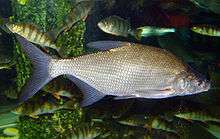bream
English

The common bream, Abramis brama
Etymology 1
From Middle English breme, from Old French breme, bresme, braisme, brasme (compare modern Old French brème), from Frankish *brahsma, *brahsima (compare Dutch brasem), from West Germanic *brahsmō (compare Old High German brahsma, brahsmo, brahsina, brehsina > modern German Brasse, Brachse (“bream”)), from Proto-Germanic *brahsmǭ, *brahsinō, *brahsmaz (“bream”), perhaps from Proto-Germanic *brehwanaz (“shining, glittery, sparkly”), from Proto-Indo-European *bʰerek- (“to shine”) (see braid (verb)).
Pronunciation
Noun
bream (plural bream or breams)
- A European fresh-water cyprinoid fish of the genus Abramis, little valued as food. Several species are known.
- (Britain) A species in that genus, Abramis brama.
- An American fresh-water fish, of various species of Lepomis and allied genera, which are also called sunfishes and pondfishes.
- A marine sparoid fish of the genus Pagellus, and allied genera. See sea bream.
Synonyms
- (Abramis brama): carp bream
Derived terms
Translations
fish of the genus Abramis
Abramis brama
|
|
American fresh-water fish, of various species of Pomotis and allied genera
|
This article is issued from
Wiktionary.
The text is licensed under Creative
Commons - Attribution - Sharealike.
Additional terms may apply for the media files.